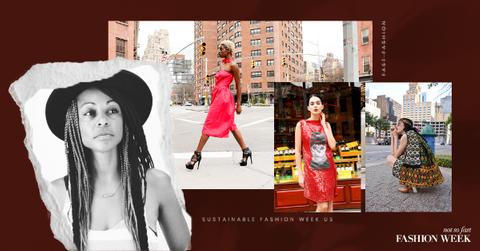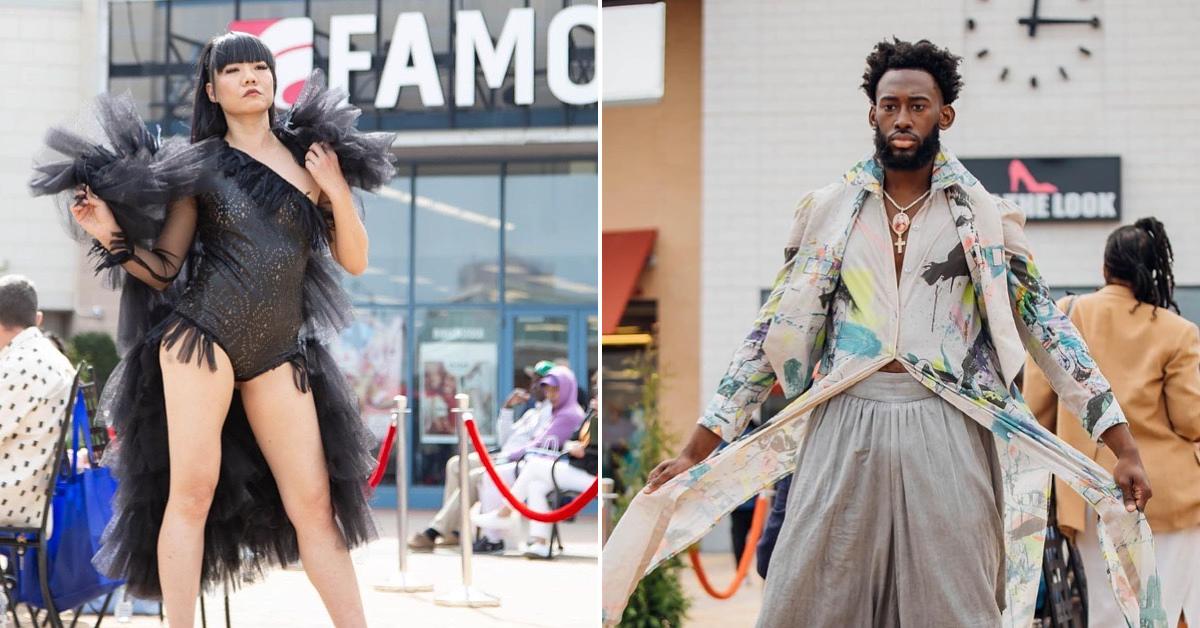Sustainable Fashion Week Is the "Anti-Trends" Answer to NYFW (Exclusive)
"As a creator, [slow fashion] means thinking about the endgame of that garment before even making it."
Published Sept. 9 2024, 9:33 a.m. ET

Headshot of Bridgett Artise alongside photos of Born Again Vintage garments
While eco-friendly fashion has been on the rise in recent years, Bridgett Artise, the founder of the annual Sustainable Fashion Week US, has been an upcycling trailblazer since the early aughts, with The New York Times even deeming her a "vintage expert."
Artise began her upcycling journey in 2001 after putting on local New Jersey talent shows for kids to raise scholarship money. "One year I got a bigger venue and an extra hour. I went thrifting for the first time, grabbed some pieces, dusted off the sewing machine, and let the kids put on a fashion show," she exclusively tells Green Matters.
Artise's reworked vintage label, Born Again Vintage, quickly emerged as a result. "After the show, people wanted to buy the pieces. Within two weeks, I was set up at a New York designer market with a table and six pieces."
The grief of losing her third child is what prompted Artise to start said talent shows. "It was 100 percent a distraction to get involved in something, give back. If I didn't go through that, I would have never did the upcycling. Born Again Vintage is a very personal brand for me," Artise shares.

Sustainable Fashion Week US in 2023.
People were clamoring for an eco-friendly fashion line, and Artise muses, "Once you start to look up the horrors of fashion, there's literally no turning back. I believe we would do better if we knew better, and I just didn't feel like the information was out there."
Her successful 2008 book, Born-Again Vintage: 25 Ways to Deconstruct, Reinvent, and Recycle Your Wardrobe, led to Artise gaining further recognition in the sustainability space, and eventually creating Sustainable Fashion Week US, its 2024 fall showcase held on Sept. 7 and 8 at the Ruth Bader Ginsburg Hall in Newark, N.J.
For our Not so Fast Fashion Week campaign, Green Matters spoke exclusively with Artise about her goals in the fashion space, how trends conflict with sustainability, and slow fashion.
This interview has been edited and condensed for length and clarity.
GM: What are the goals of Sustainable Fashion Week US?
BA: Outside of the support of indie, emerging, and student sustainable designers, it's 100 percent about spreading awareness. It would be counterproductive to produce a show just like NYFW, so with our shows, it's always either a panel, a screening with information, or a workshop. I love to trick people into learning things.
We made it an on-the-road thing. There are so many upcyclers and sustainable designers in these small-pocket areas of the world. We've had our show in Philadelphia, Chicago, Baltimore, New Jersey, and New York. We're planning a 2025 show in New Orleans.
GM: How do you believe we can embrace trending fashion sustainably?
BA: Can we? I am 100 percent anti-trends because I think that fuels over consumption and fast fashion. When we think of trends, it's something that's fleeting. I don't know if I could say that the two worlds belong together.
Regarding changing messaging attached to trends, I would definitely make it about buying something based on your aesthetic and style and keeping it for when it comes back around. It doesn't have to be thrown out just because it's not on trend anymore; nine times out of 10 it does circle back.
GM: What is “slow fashion” to you?
BA: As a creator, it means thinking about the endgame of that garment before even making it. I'm not going to create something that I know will take 1,000 years to decompose. I think consumers think slow fashion is more about not throwing something out and either recycling it, giving it away, or donating it. The person making it is thinking about the endgame, and the person buying it is thinking about the endgame, period.
GM: What advice would you give to the average person who wants to live sustainably but also amp up their overall style and wardrobe?
BA: The best and most cost-effective way to start is through thrifting. I don't know who made up the line, but they were brilliant: "The most sustainable item is always going to be the item in your closet." You have to be aware of if you need that particular piece, and if it's something you're going to cherish for years and years.
People are not going to stop shopping. Until there's some real legislation and policy changes, they're not going to stop overproducing. The only thing that we can change is the mindset of the consumer, or at least give them the information and let them make the decision. I do think people would shop differently if they saw that video I saw with the little kids walking around in a village, blue from head to toe from dyeing our jeans.
This article is part of Green Matters’ 2024 Fashion Week programming, Not so Fast Fashion Week: A series about the designers, stylists, and creators using their creativity to push against fast fashion.